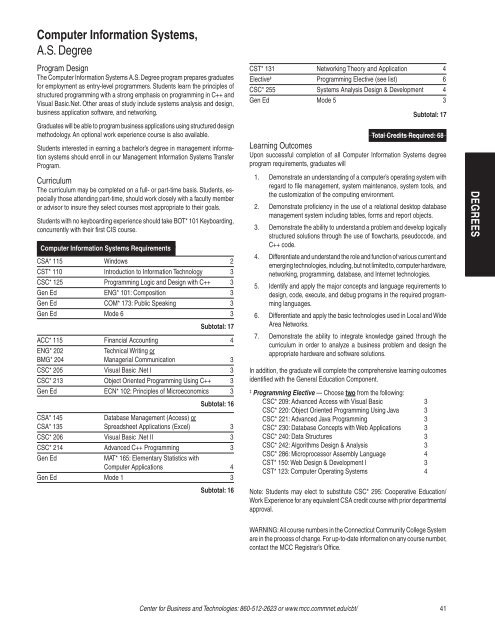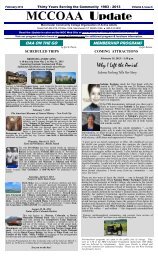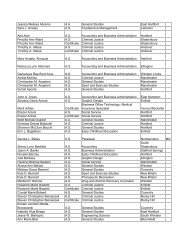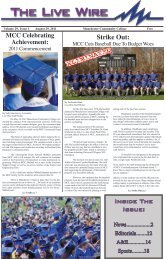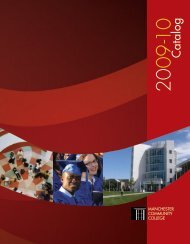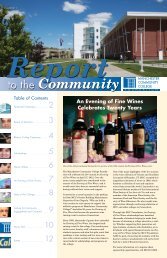Liberal Arts and Science - Manchester Community College ...
Liberal Arts and Science - Manchester Community College ...
Liberal Arts and Science - Manchester Community College ...
Create successful ePaper yourself
Turn your PDF publications into a flip-book with our unique Google optimized e-Paper software.
Computer Information Systems,<br />
A.S. Degree<br />
Program Design<br />
The Computer Information Systems A.S. Degree program prepares graduates<br />
for employment as entry-level programmers. Students learn the principles of<br />
structured programming with a strong emphasis on programming in C++ <strong>and</strong><br />
Visual Basic.Net. Other areas of study include systems analysis <strong>and</strong> design,<br />
business application software, <strong>and</strong> networking.<br />
Graduates will be able to program business applications using structured design<br />
methodology. An optional work experience course is also available.<br />
Students interested in earning a bachelor’s degree in management information<br />
systems should enroll in our Management Information Systems Transfer<br />
Program.<br />
Curriculum<br />
The curriculum may be completed on a full- or part-time basis. Students, especially<br />
those attending part-time, should work closely with a faculty member<br />
or advisor to insure they select courses most appropriate to their goals.<br />
Students with no keyboarding experience should take BOT* 101 Keyboarding,<br />
concurrently with their first CIS course.<br />
Computer Information Systems Requirements<br />
CSA* 115 Windows 2<br />
CST* 110 Introduction to Information Technology 3<br />
CSC* 125 Programming Logic <strong>and</strong> Design with C++ 3<br />
Gen Ed ENG* 101: Composition 3<br />
Gen Ed COM* 173: Public Speaking 3<br />
Gen Ed Mode 6 3<br />
Subtotal: 17<br />
ACC* 115 Financial Accounting 4<br />
ENG* 202 Technical Writing or<br />
BMG* 204 Managerial Communication 3<br />
CSC* 205 Visual Basic .Net I 3<br />
CSC* 213 Object Oriented Programming Using C++ 3<br />
Gen Ed ECN* 102: Principles of Microeconomics 3<br />
Subtotal: 16<br />
CSA* 145 Database Management (Access) or<br />
CSA* 135 Spreadsheet Applications (Excel) 3<br />
CSC* 206 Visual Basic .Net II 3<br />
CSC* 214 Advanced C++ Programming 3<br />
Gen Ed MAT* 165: Elementary Statistics with<br />
Computer Applications 4<br />
Gen Ed Mode 1 3<br />
Subtotal: 16<br />
CST* 131 Networking Theory <strong>and</strong> Application 4<br />
Elective ‡ Programming Elective (see list) 6<br />
CSC* 255 Systems Analysis Design & Development 4<br />
Gen Ed Mode 5 3<br />
Subtotal: 17<br />
Total Credits Required: 68<br />
Learning Outcomes<br />
Upon successful completion of all Computer Information Systems degree<br />
program requirements, graduates will<br />
1. Demonstrate an underst<strong>and</strong>ing of a computer’s operating system with<br />
regard to file management, system maintenance, system tools, <strong>and</strong><br />
the customization of the computing environment.<br />
2. Demonstrate proficiency in the use of a relational desktop database<br />
management system including tables, forms <strong>and</strong> report objects.<br />
3. Demonstrate the ability to underst<strong>and</strong> a problem <strong>and</strong> develop logically<br />
structured solutions through the use of flowcharts, pseudocode, <strong>and</strong><br />
C++ code.<br />
4. Differentiate <strong>and</strong> underst<strong>and</strong> the role <strong>and</strong> function of various current <strong>and</strong><br />
emerging technologies, including, but not limited to, computer hardware,<br />
networking, programming, database, <strong>and</strong> Internet technologies.<br />
5. Identify <strong>and</strong> apply the major concepts <strong>and</strong> language requirements to<br />
design, code, execute, <strong>and</strong> debug programs in the required programming<br />
languages.<br />
6. Differentiate <strong>and</strong> apply the basic technologies used in Local <strong>and</strong> Wide<br />
Area Networks.<br />
7. Demonstrate the ability to integrate knowledge gained through the<br />
curriculum in order to analyze a business problem <strong>and</strong> design the<br />
appropriate hardware <strong>and</strong> software solutions.<br />
In addition, the graduate will complete the comprehensive learning outcomes<br />
identified with the General Education Component.<br />
‡ Programming Elective — Choose two from the following:<br />
CSC* 209: Advanced Access with Visual Basic 3<br />
CSC* 220: Object Oriented Programming Using Java 3<br />
CSC* 221: Advanced Java Programming 3<br />
CSC* 230: Database Concepts with Web Applications 3<br />
CSC* 240: Data Structures 3<br />
CSC* 242: Algorithms Design & Analysis 3<br />
CSC* 286: Microprocessor Assembly Language 4<br />
CST* 150: Web Design & Development I 3<br />
CST* 123: Computer Operating Systems 4<br />
Note: Students may elect to substitute CSC* 295: Cooperative Education/<br />
Work Experience for any equivalent CSA credit course with prior departmental<br />
approval.<br />
WARNING: All course numbers in the Connecticut <strong>Community</strong> <strong>College</strong> System<br />
are in the process of change. For up-to-date information on any course number,<br />
contact the MCC Registrar’s Office.<br />
Center for Business <strong>and</strong> Technologies: 860-512-2623 or www.mcc.commnet.edu/cbt/<br />
41<br />
DEGREES


